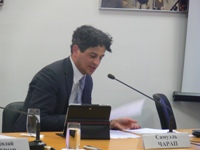Registration
You will receive an email confirming your registration.
IMGXYZ2967IMGZYXThe consequences of the Georgia-Abkhazia, Georgia-South Ossetia, and Georgia-Russia conflicts pose problems for each of the parties involved. Today, according to Samuel Charap, director for Russia and Eurasia at the Center for American Progress, all of these parties have some incentive to take constructive steps toward improving relations with each other. There is an obvious need to adopt a plan to strengthen mutual trust and prevent further bloodshed in the region.
At an event at the Carnegie Moscow Center, Charap presented the report, A Plan for Short-Term Progress on the Georgia Conflicts, which he co-authored with Cory Welt, associate director of the Institute for European, Russian and Eurasian Studies at the George Washington University. Charap was joined by Vitaly Naumkin, director of the Institute of Oriental Studies, Russian Academy of Sciences. Carnegie’s Nikolay Petrov moderated.
The August 2008 Conflict
- Conflict assessment: According to Charap, the hostilities began as a result of a “security dilemma”—a situation where the defensive actions of one side were viewed as offensive by the other. Both Georgia and Russia (along with South Ossetia) became involved in the war not because one country launched a plan of aggression, but because both sides erroneously interpreted the actions of the other right up until the night of August 7, and took them as evidence that the opponent had already begun a pre-planned operation. Acting on this assumption, both sides reacted to the situation by initiating military conflict. Thus, Charap argued, it was essentially an unintended war on all sides.
- Consequences of the conflict: After the August 2008 conflict, Russia officially recognized the independence of Abkhazia and South Ossetia. This led to various problems in the international arena and created obstacles in the development of bilateral relations between Russia and the United States, the European Union, and its member states.
A Plan for Short-Term Progress on the Georgia Conflicts: Main Points
- Bilateral agreements: According to Charap, bilateral agreements directed at resolving humanitarian issues and promoting public security are possible between the Georgian government and authorities in Abkhazia and South Ossetia. They can easily be constructed in ways that do not imply recognition of Abkhazian and South Ossetian independence. Charap argues that the Georgian government should have nothing against signing agreements with what they would consider, under normal circumstances, to be regional autonomous authorities—as was the case before the conflicts.
- Independent humanitarian monitoring: The Kremlin, along with Abkhazian and South Ossetian authorities, refuses to allow the European Union Monitoring Mission in Georgia (EUMM) into Abkhazia and South Ossetia. Moscow maintains that the ceasefire agreements explicitly mandate an EU presence only on the Georgian government-controlled side of the conflict lines. Regardless of this dispute, however, all sides have an interest in an impartial monitor to verify both protection of human rights and human security of populations that cross boundaries and to help avoid security provocations or low-level conflicts that might escalate. None of the sides is capable of achieving these goals by themselves. In Charap’s opinion, bilateral agreements should thus allow the EUMM access to Abkhazia and South Ossetia but in ways that do not invoke the parties’ differences about the mission’s existing mandate.
- Human security needs of transboundary populations: The current boundaries between Georgia and Abkhazia, as well as between Georgia and South Ossetia, artificially divide the transboundary populations, who regularly need to cross the line of conflict. It is necessary to ensure their safety and freedom of movement. Otherwise, incidents involving these populations could turn violent and snowball into full-scale conflict.
Recommendations for the Georgian and Russian Governments
- Recommendations for the Georgian government: Georgia should show goodwill and maintain good relations with all the international actors that are active in Abkhazia and South Ossetia, Charap said. At the same time, Georgia should boost mutually beneficial cooperation with Russian regions neighboring Georgia but try to take into account Moscow’s concerns about Georgian initiatives on Russian territory and be as open as possible.
- Recommendations for the Russian government: Charap identified the following recommendations:
- Nonuse of force: To mirror Georgian President Mikheil Saakashvili’s November 2010 statement about nonuse of force against Abkhazia and South Ossetia, Russia should also issue a nonuse of force statement of a similar nature, Charap noted. This would assure the international community that Russia has no intention of using force against Georgia again. Russia can take this step without having to reverse its positions on South Ossetia’s and Abkhazia’s status and Georgia’s borders, or admitting to being a party to the 2008 conflict, Charap added.
- Steps toward the normalization of relations: According to Charap, Russian authorities should also soften their rhetoric against Tbilisi, simplify visa regime for Georgian citizens, and maximize humanitarian and economic ties between Russia and Georgia.
- Nonuse of force: To mirror Georgian President Mikheil Saakashvili’s November 2010 statement about nonuse of force against Abkhazia and South Ossetia, Russia should also issue a nonuse of force statement of a similar nature, Charap noted. This would assure the international community that Russia has no intention of using force against Georgia again. Russia can take this step without having to reverse its positions on South Ossetia’s and Abkhazia’s status and Georgia’s borders, or admitting to being a party to the 2008 conflict, Charap added.
Naumkin added that resolving the Georgian-Russian contradictions is impossible without engaging Abkhazia and South Ossetia in the negotiation process as equal participants.
Charap concluded by stressing that the measures outlined in the plan are aimed at building confidence, normalizing relations between the conflicting governments and peoples, and establishing new ties. This reflects the interests of all parties involved in all of the Georgian conflicts, despite the fundamental differences that divide them today, he said.
